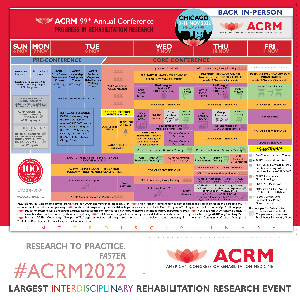Back
COVID-19
Impact of COVID-19 Pandemic on Reorganization of a Rehabilitation Unit in Italy
Friday, November 11, 2022
10:09 AM – 10:14 AM
Location: Station 6
- MM
Maria Chiara Maccarone, n/a
Resident
University of Padua, Italy - SM
Stefano Masiero
Professor and Chair Physical Medicine and Rehabilitation, Medical Director.
University of Padua, United States
Presenting Author(s)
Non-presenting Author(s)
Research Objectives: To investigate and describe the changes that the COVID-19 pandemic has determined in the organization of the Rehabilitation, particularly in the rehabilitative management of patients with acute infection and Long Covid syndrome.
Design: A survey was performed from May to August 2020, during the first pandemic surge.
Setting: The study was conducted at padua General Hospital - University, namely in the Rehabilitation Unit, Department of Neuroscience.
Participants: Patients referred to the Rehabilitation Unit completed the survey.
Interventions: A questionnaire was provided to each patient who accessed our outpatient clinics or who was contacted via digital devices. Patients completed the survey before the visit.
Main Outcome Measures: Not applicable.
Results: Overall, 121 questionnaires completed by patients were analysed. The study participants were 91 female and 30 male patients.
The reorganization of the activities by establishing treatment priorities and continuing to ensure early rehabilitative interventions in acute conditions has been essential to rationalize the deployment of staff and personal protective equipment in the emergency. Patients with acute infections were generally rehabilitated in hospital settings, but patients with Long Covid syndrome were largely rehabilitated in out-of-hospital settings. During the pandemic surge, the volume of ambulatory visits had decreased by 70%. Of the remaining visits, approximately 50% were performed via e-mail, 30% telephonically and 20% (nonpostponable evaluations) in person. Data have shown that 81% of patients preferred face-to-face visits rather than alternative communication methods and only 9% preferred to avoid the ambulatory visit because of the fear of contagion.
Conclusions: As in-person evaluations and treatments have proven to be preferred by patients and hospitals cannot deal with the patient load during the pandemic, out-of-hospital alternatives, may be necessary, for example, to take care of patients with persistent outcomes after recovery from acute COVID-19 infection, such as fatigue or neurocognitive deficits.
Author(s) Disclosures: No conflict of interests to declare.
Design: A survey was performed from May to August 2020, during the first pandemic surge.
Setting: The study was conducted at padua General Hospital - University, namely in the Rehabilitation Unit, Department of Neuroscience.
Participants: Patients referred to the Rehabilitation Unit completed the survey.
Interventions: A questionnaire was provided to each patient who accessed our outpatient clinics or who was contacted via digital devices. Patients completed the survey before the visit.
Main Outcome Measures: Not applicable.
Results: Overall, 121 questionnaires completed by patients were analysed. The study participants were 91 female and 30 male patients.
The reorganization of the activities by establishing treatment priorities and continuing to ensure early rehabilitative interventions in acute conditions has been essential to rationalize the deployment of staff and personal protective equipment in the emergency. Patients with acute infections were generally rehabilitated in hospital settings, but patients with Long Covid syndrome were largely rehabilitated in out-of-hospital settings. During the pandemic surge, the volume of ambulatory visits had decreased by 70%. Of the remaining visits, approximately 50% were performed via e-mail, 30% telephonically and 20% (nonpostponable evaluations) in person. Data have shown that 81% of patients preferred face-to-face visits rather than alternative communication methods and only 9% preferred to avoid the ambulatory visit because of the fear of contagion.
Conclusions: As in-person evaluations and treatments have proven to be preferred by patients and hospitals cannot deal with the patient load during the pandemic, out-of-hospital alternatives, may be necessary, for example, to take care of patients with persistent outcomes after recovery from acute COVID-19 infection, such as fatigue or neurocognitive deficits.
Author(s) Disclosures: No conflict of interests to declare.
Learning Objectives:
- Upon completion, participant will be able to understand how to reorganise a rehabilitation service during emergency situations, such as a pandemic.
- Upon completion, participant will be able to formulate hypotheses for taking care of patients with rehabilitation needs outside the hospital setting and to discuss their usefulness.
- Upon completion, participant will be able to detect the medium- to long-term outcomes of COVID-19 infection and rehabilitation needs, and propose solutions, including out-of-hospital management, to these emerging rehabilitation needs.

.jpg)
